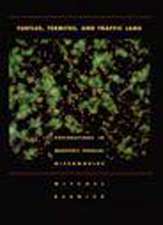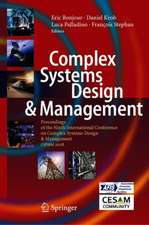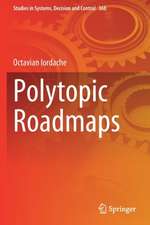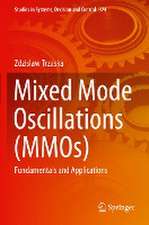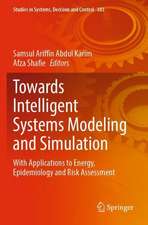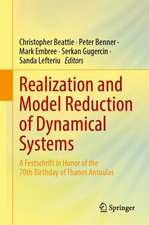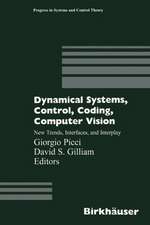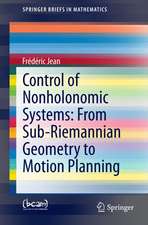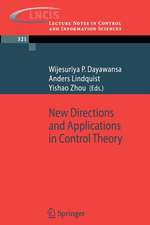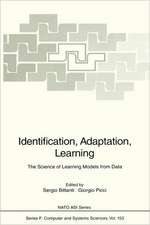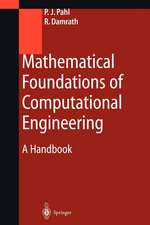Linear Stochastic Systems: A Geometric Approach to Modeling, Estimation and Identification: Series in Contemporary Mathematics, cartea 1
Autor Anders Lindquist, Giorgio Piccien Limba Engleză Paperback – 29 oct 2016
| Toate formatele și edițiile | Preț | Express |
|---|---|---|
| Paperback (1) | 1022.66 lei 6-8 săpt. | |
| Springer Berlin, Heidelberg – 29 oct 2016 | 1022.66 lei 6-8 săpt. | |
| Hardback (1) | 1029.27 lei 6-8 săpt. | |
| Springer Berlin, Heidelberg – 11 mai 2015 | 1029.27 lei 6-8 săpt. |
Preț: 1022.66 lei
Preț vechi: 1247.14 lei
-18% Nou
Puncte Express: 1534
Preț estimativ în valută:
195.69€ • 204.83$ • 162.87£
195.69€ • 204.83$ • 162.87£
Carte tipărită la comandă
Livrare economică 31 martie-14 aprilie
Preluare comenzi: 021 569.72.76
Specificații
ISBN-13: 9783662526187
ISBN-10: 3662526182
Pagini: 796
Ilustrații: XV, 781 p. 37 illus.
Dimensiuni: 155 x 235 x 40 mm
Greutate: 1.1 kg
Ediția:Softcover reprint of the original 1st ed. 2015
Editura: Springer Berlin, Heidelberg
Colecția Springer
Seria Series in Contemporary Mathematics
Locul publicării:Berlin, Heidelberg, Germany
ISBN-10: 3662526182
Pagini: 796
Ilustrații: XV, 781 p. 37 illus.
Dimensiuni: 155 x 235 x 40 mm
Greutate: 1.1 kg
Ediția:Softcover reprint of the original 1st ed. 2015
Editura: Springer Berlin, Heidelberg
Colecția Springer
Seria Series in Contemporary Mathematics
Locul publicării:Berlin, Heidelberg, Germany
Cuprins
Introduction.- Geometry of Second-Order Random Processes.- Spectral Representation of Stationary Processes.- Innovations, Wold Decomposition, and Spectral Factorization.- Wold Decomposition and Spectral Factorization in Continuous Time.- Linear Finite-Dimensional Stochastic Systems.- The Geometry of Splitting Subspaces.- Markovian Representations.- Proper Markovian Representations in Hardy Space.- Stochastic Realization Theory in Continuous Time.- Stochastic Balancing and Model Reduction.- Finite-Interval Stochastic Realization and Partial Realization Theory.- Subspace Identification for Time Series.- Zero Dynamics and the Geometry of the Riccati Inequality.- Smoothing and Interpolation.- Acausal Linear Stochastic Models and Spectral Factorization.- Stochastic Systems with Inputs.- Appendix A. Basic Principles of Deterministic Realization Theory.- Appendix B. Some Topics in Linear Algebra and Hilbert Space Theory
Recenzii
“The purpose of this book is to present the mathematical background necessary for understanding the linear state-space modeling of second-order random processes and its applications to estimation and identification theory. … this monograph is an excellent reference for researchers interested in geometric theory of stochastic realization and its applications.” (Viorica M. Ungureanu, Mathematical Reviews, January, 2016)
Textul de pe ultima copertă
This book presents a treatise on the theory and modeling of second-order stationary processes, including an exposition on selected application areas that are important in the engineering and applied sciences. The foundational issues regarding stationary processes dealt with in the beginning of the book have a long history, starting in the 1940s with the work of Kolmogorov, Wiener, Cramér and his students, in particular Wold, and have since been refined and complemented by many others. Problems concerning the filtering and modeling of stationary random signals and systems have also been addressed and studied, fostered by the advent of modern digital computers, since the fundamental work of R.E. Kalman in the early 1960s. The book offers a unified and logically consistent view of the subject based on simple ideas from Hilbert space geometry and coordinate-free thinking. In this framework, the concepts of stochastic state space and state space modeling, based on the notion of the conditional independence of past and future flows of the relevant signals, are revealed to be fundamentally unifying ideas. The book, based on over 30 years of original research, represents a valuable contribution that will inform the fields of stochastic modeling, estimation, system identification, and time series analysis for decades to come. It also provides the mathematical tools needed to grasp and analyze the structures of algorithms in stochastic systems theory.
Caracteristici
Maximizes reader insights into stochastic modeling, estimation, system identification, and time series analysis Reveals the concepts of stochastic state space and state space modeling to unify the idea Supports further exploration through a unified and logically consistent view of the subject






